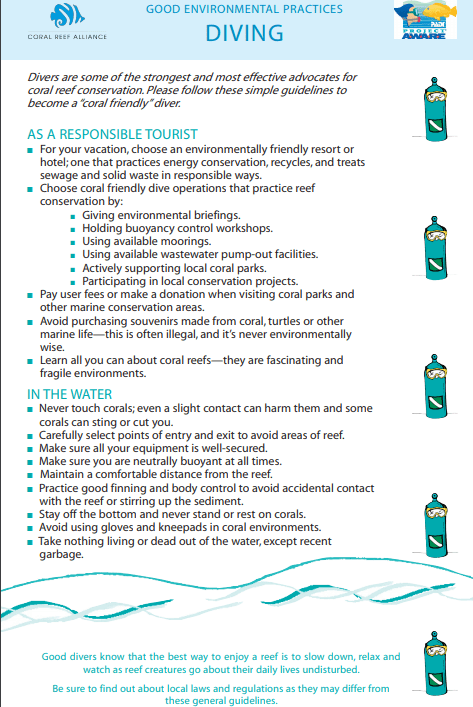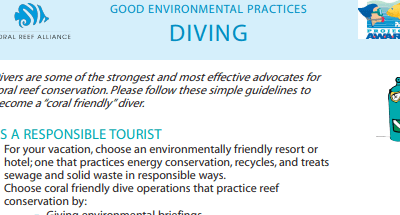Divers are some of the strongest and most effective advocates for coral reef conservation. Please follow these simple guidelines to become a “coral friendly” diver.

As A Responsible Tourist Minimize Contact With Marine Life
- For your vacation, choose an environmentally friendly resort or hotel; one that practices energy conservation, recycles, and treats sewage and solid waste in responsible ways.
- Choose coral friendly dive operations that practice reef conservation by:
- Giving environmental briefings.
- Holding buoyancy control workshops.
- Using available moorings
- Using available wastewater pump-out facilities.
- Actively supporting local coral parks.
- Participating in local conservation projects.
- Pay user fees or make a donation when visiting coral parks and other marine conservation areas.
- Avoid purchasing souvenirs made from coral, turtles or other marine life—this is often illegal, and it’s never environmentally wise.
- Learn all you can about coral reefs—they are fascinating and fragile environments.
In The Water
- Never touch corals; even a slight contact can harm
- them and some corals can sting or cut you.
- Carefully select points of entry and exit to avoid reef
- areas.
- Make sure all your equipment is well-secured.
- Make sure you are neutrally buoyant at all times.
- Maintain a comfortable distance from the reef.
- Practice good finning and body control to avoid
- accidental contact with the reef or stirring up the
- sediment.
- Stay off the bottom and never stand or rest on corals.
- Avoid using gloves and kneepads in coral environments.
- Take nothing living or dead out of the water, except
- recent garbage.
Photography & Videography
Divers need advanced diving skills to take pictures and video underwater. Photographic and video equipment is cumbersome and affects a diver’s buoyancy and mobility in the water.
It is all too easy to touch and damage marine life when concentrating on “the perfect shot.”
Minimize Contact With Marine Life
- Never chase, harass or try to ride marine life.
- Do not touch, handle or feed marine life except under expert guidance and following established guidelines.
On Dive Boats
- Choose dive operations whose boats make use of available moorings—anchors and chains destroy fragile corals.
- Make sure garbage is well stowed, especially light plastic items.
- Be sure to take away everything you brought on board, such as packaging, used batteries and bottles.
Shoreside
- Support coral parks and other conservation projects:
- Visit established coral parks and pay applicable user fees that support marine conservation.
- Encourage and support the use of dive moorings.
- Participate in local initiatives to monitor the marine environment.
- Participate in cleanups.
- Make a donation or volunteer your skills to support a coral park. For example, you can participate in a reef survey, conduct outreach, or help educate others about coral reef conservation.
- Donate used equipment such as cameras, dive gear or reef identification books.
- Speak up. Make sure your dive buddies understand these simple but important conservation practices.
Good divers know that the best way to enjoy a reef is to slow down, relax and watch as reef creatures go about their daily lives undisturbed. Be sure to find out about local laws and regulations as they may differ from these general guidelines.
Acknowledgment: Coral Reef Alliance | 1330 Broadway, Suite 600 Oakland, CA 94612 USA | Contact: 1.888.Coral.Reef | [email protected]

